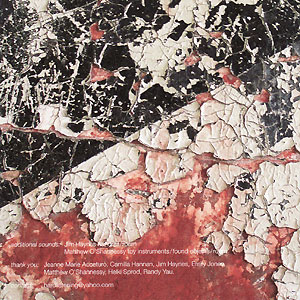
 |
|
 |
Format: CD Label & Cat.Number: 23five Incorporated 23five 014 Release Year: 2009 Note: early CD by the Australian "non-music" or "more than music" field recording artist, using far away sounds but also very near objects for his often incomprehensible compositions; "The sounds become signifiers of desolation, solitude, a creeping sense of life that has no human presence. This metaphorical approach moves the result into fictive, often surreal territory, but, like G*Park, Sprod’s recording method is austere but meticulous.." [Dusted Mag] BACK IN STOCK!
Price (incl. 19% VAT): €14.00 More InfoIn der mächtig wachsenden Field Recording-Szene hat sich der Australier TARAB durch seinen besonderen Stil inzwischen einen Namen gemacht... Seine Aufnahmen schwanken zwischen den Polen des "ganz nahen" und Detaillierten und dem "entfernten, verhallten, undeutlichen, verrauschten", wobei er v.a. rauhe, knirschend-knarzige, metallisch-quietschende "Granular-Sounds" bevorzugt. Gewohnte musikalische Parameter spielen hier keine Rolle mehr, die editierten Soundschnipsel ergeben "nicht-harmonische" aber doch Emotionen und Intellekt herausfordernde dynamische Strukturen... das ist atmosphärische, experimentelle Musique Concrete mit Drone-Elementen. TIP !!"The title to this album from Tarab (nee Eamon Sprod) is striking enough in its allusions of damnation, with a watery grave a potential outcome from human activity impacting the earth. So, it may be stating the obvious that the corroded locations where mankind has scarred the surface of the earth feature prominently in the work of this Melbourne based sound artist. The residual elements of these sites become the agents for metaphor and allegory in Tarab's work, documented through field recording and sympathetic actions with found objects from those sites. One such location that features prominently in Take All of the Ships... is Angel Island in the San Francisco Bay. Once the home of an immigration station at the turn of the 20th Century and later a Nike Missile site for the US military, Angel Island now rests in the hands of the US National Park Service, which has left some of the buildings to succumb to the forces of decay. From the sounds culled from this site and others closer to his antepodean home, Tarab diligently overlays and stiches together a highly tactile composition with very little digital treatments to speak of.Take All of the Ships... opens with an ominous rumble whose frequencies appear to emerge from the center of the Earth and liquefying the surface upon impact. As these tones ebb and flow, Tarab unveils as revolving series of exaggerated details from a hyperbolic gash of two heavy pieces of metal grinding against themselves to a toxic chorale of nighttime insects to sand, wind, and surf detourned into sedimentary white noise. Tarab's compositional sensibility shifts throughout the album, at first sparsely situating these sounds into shadowy vignettes. Gradually, Tarab coalesces this sublime opus into an arcing crescendo which exhibits sustained harmonics rarely heard in the best of the contemporary dronemusik technicians much less from the realm of sound ecology." [label description] "Like much work in the hybrid, Take all the ships..., a 55 minute suite of environmental sound, is drawn from a few specific places (in this case, Angel Island, a deserted military base turned national park), but is not really meant to be about that place. Instead, it is a layered series of sonic events that act as metaphors. The dominant mood here is bleak and overcast, and certain motifs recur: wind howling and whistling through pipes, ice cracking and tinkling, shortwave radio transmissions, the complaint of metal being scrapped and twisted, booming reverb that seemingly has no source. The sounds become signifiers of desolation, solitude, a creeping sense of life that has no human presence. This metaphorical approach moves the result into fictive, often surreal territory, but, like G*Park, Sprod’s recording method is austere but meticulous. This means that his sounds retain plenty of natural reverb and keep their stochastic character. They hold the interest even when the inevitable lulls in activity set in, those moments when the piece feels more episodic than fully developed. But in their precision and ability to evoke tactile images, Sprod’s sounds are powerful ones, reminiscent of what Tod Dockstader has said about the sounds he preferred: "“I like to have edges. Sound to me is always very physical. I can feel, not just hear it. It has personality. It has weight, proportion. It’s like I can pick it up and hold it." The sounds are masked, but not abstracted. They are the kind of lies you want to believe." [Matthew Wuethrich, Dusted Mag] www.23five.org |
| © 2007 Drone Records | | Celler Strasse 33, 28205 Bremen, Germany | Privacy and cookies policy | Impressum / Allgemeine Geschaftsbedingungen / Haftungsausschluss | Links to the scene |